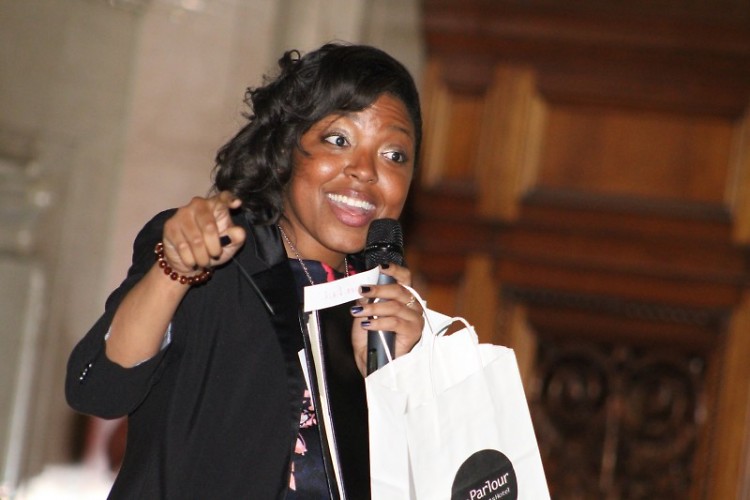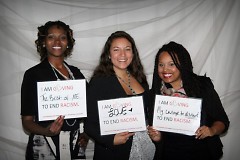I’m tired of writing about race.
The idea that I have to continuously educate the world on a socialized and institutionalized structure that impacts my existence pains me; the fact that I have to find a nice way to make people care about it pisses me off.
However, I am painfully aware of the fact that not only is talking about race crucial and contextualizing it vital – it’s also an existential necessity. Let me repeat that: talking about race and giving context around how it has evolved and how it currently exists is crucial. These are facts. Yet, we do not do this. And even more problematic is the fact that we consciously do not engage in talking about the historical foundations of race and its evolution with the people who are equipped to make the most difference- young people.
In Grand Rapids we have this false sense of transcendence when it comes to young people and issues of race. Young people in this city are inundated with messaging that suggests they occupy a post-racial space, yet their lives continue to be shaped by the stains of our past and our misconceptions of the present. The fact that showing a movie like DOPE and crafting a narrative around how the themes of imagery and perception could be perceived as heavily controversial because of a misconceived notion of appropriateness is what makes having conversations with young people about race next to impossible in greater Grand Rapids. Parents want to shield their children from understanding the realities they are already faced with - community leaders want to frame the discussion in a way that is palatable to their desires but irrelevant to the realities of youth.
We know young people are not learning about racism in schools – they barely functionally discuss slavery and the civil rights movement. We know parents are often not equipped nor available to engage in crucial dialogues with their children about race on the most basic level. We know that children of color have a complex relationship with understanding how race impacts their life while being socialized in a space that tells them they live in a post racial world because they have a black president.
Our young people are being socialized in a complex space where race shapes their existence but is actively removed from their learning environments. For young people, race is made irrelevant while carrying with it a dangerous outcome: passive participation in the continuous perpetuation of racism. The work that I do around race on a daily basis is irrelevant if we are not actively developing programming that makes young people of all ages active participants in the conversation.
On days like the Martin Luther King Jr. holiday, what are we doing to educate young people about race and racism? In short, the answer is nothing. Some parents will intentionally turn on that PBS documentary, if they have television or are not occupied at work, but the rest will treat it like every other day their children are home from school. But I refuse to put all of the blame for our decision to not educate students about race on parents; as a community we have failed as well. In the countless events we are hosting to celebrate Martin Luther King Jr. Day, how many target youth? How many are discussing race and racism in the ways young people are faced with it today?
One struggle that I experience in designing programming that meets young people where they are at in racial discourse is that there is this apprehension to deal with it in a real way. We have this culture of respectability politics that refuses to allow us to engage with young people in real discourse about what is shaping their racial perceptions. For young people, their perceptions are being shaped in nuanced ways. In many ways, they are being socialized to understand race in a way that reinforces negative stereotypes and specific directives for destruction.
Young people, in all of the endless forms of media they consume, are shown imagery that they are not developed enough to catch as being damaging in shaping their perceptions of people while also impacting the formulation of their unconscious bias.
How sex is portrayed, how consent is expressed (or lack thereof), how language use is praised or criticized are all relevant considerations in talking about racism yet it is never discussed. It is partially never discussed because adults are stuck arguing about explicit racism and bias while young people are left to deal with the realities that their understanding of racism is being built by an invisible force that they will become a power in shaping upon adulthood.
Our young people are listening to music that covers a range of subjects and encompasses a use of language that is beyond the understanding of adults collectively – they need to talk about it. Our young people are consuming images that show them women of certain associations as specific objects without variation, highly sexualized and selectively brutalized – they need to talk about it. Our young people actively utilize hurtful stereotypes as a way of establishing a sense of supremacy – they need to talk about it.
As much as you or I may not care for the terminology associated with their experience, we need to create a space where they can discuss this freely and without judgment. Congratulations, you don’t like the music they listen to – but guess what, you created the circumstances for the oppression that penned the tale you cannot identify with.
So yes, we need to talk to our kids of all ages about race and racism and in that discussion we need to talk about all the ways in which they experience it whether we like the imagery or not.
The Rapidian, a program of the 501(c)3 nonprofit Community Media Center, relies on the community’s support to help cover the cost of training reporters and publishing content.
We need your help.
If each of our readers and content creators who values this community platform help support its creation and maintenance, The Rapidian can continue to educate and facilitate a conversation around issues for years to come.
Please support The Rapidian and make a contribution today.


